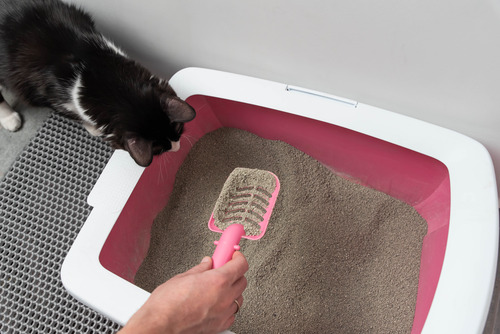If you’re a cat owner, keeping your cat’s litter box clean is not just about eliminating odors; it’s also about ensuring your cat’s happiness and health. Understanding how often to change cat litter is key to maintaining a clean environment for both you and your pet. Montgomery Veterinary Associates, located in Montgomery, AL, is dedicated to supporting pet owners with valuable insights into pet care. In this blog, we’ll explore the importance of regular litter changes, the different types of cat litter, and some tips to keep your cat’s litter box in top condition.
Understanding the Basics of Litter Box Maintenance
Types of Cat Litter
Before diving into how often to change cat litter, it’s important to understand the different types available. There are several kinds of cat litter, including:
- Clumping
- Non-clumping,
- Silica gel
- Natural varieties
Each type has its own advantages and recommended changing frequencies, which can affect how often you’ll need to perform a full litter change.
Why Regular Changes Are Important
Regularly changing your cat’s litter is essential for preventing the buildup of harmful bacteria and odors. A clean litter box is not only more appealing to your cat but also helps keep your home smelling fresh. Furthermore, maintaining a clean litter box encourages proper litter box use, preventing behavioral issues related to bathroom habits.
How Often to Change Cat Litter
The frequency of changing your cat’s litter depends on several factors, including the type of litter you use, the number of cats you have, and your cats’ bathroom habits. Here’s a general guideline to follow:
- Clumping Litter: For clumping litter, it’s recommended to scoop out clumps and solid waste daily, with a full change and cleaning of the box every two weeks.
- Non-Clumping Litter: Non-clumping litter should be scooped out daily, with a complete litter change and box cleaning once a week.
- Silica Gel Litter: This type of litter requires less frequent changes, typically every three to four weeks, but it’s important to remove solid waste and stir the pellets daily.
- Natural Litter: Depending on the brand and material (e.g., paper, wood, corn), the change frequency can vary. Generally, a full change should be done every two weeks, along with daily waste removal.
Factors Affecting Change Frequency
If you have more cats, that means more frequent changes are necessary. Make sure you observe your cat’s habits, as some cats may require more frequent changes.The type of litter box may affect frequency as well. Automated cleaning boxes may need less frequent changes, but manual scooping boxes will need regular attention.
Tips for Maintaining a Clean Litter Box
- Keep the litter box in a quiet, low-traffic area where your cat feels safe.
- Remove waste daily to keep the box fresh and encourage use.
- When changing the litter, wash the box with soap and water to remove lingering odors and bacteria.
- A sudden change in litter box usage can indicate health problems, so observe your cat’s habits and consult with a vet if necessary.
Montgomery Veterinary Associates is here to support your pet care needs. If you have concerns about your cat’s health or behavior related to litter box use, don’t hesitate to call our Vaughn Road location at (334) 271-1003 or our Carter Hill location at (334) 269-2508. You can also request an appointment online for personalized advice and care.
A Fresh Approach to Litter Box Maintenance
Maintaining a clean and odor-free litter box is crucial for your cat’s well-being. By following these guidelines on how often to change cat litter and implementing regular maintenance routines, you’ll create a healthier and happier environment for your cat. Remember, if you ever need assistance or have concerns about your cat’s health or litter box habits, Montgomery Veterinary Associates is just a call or click away.






